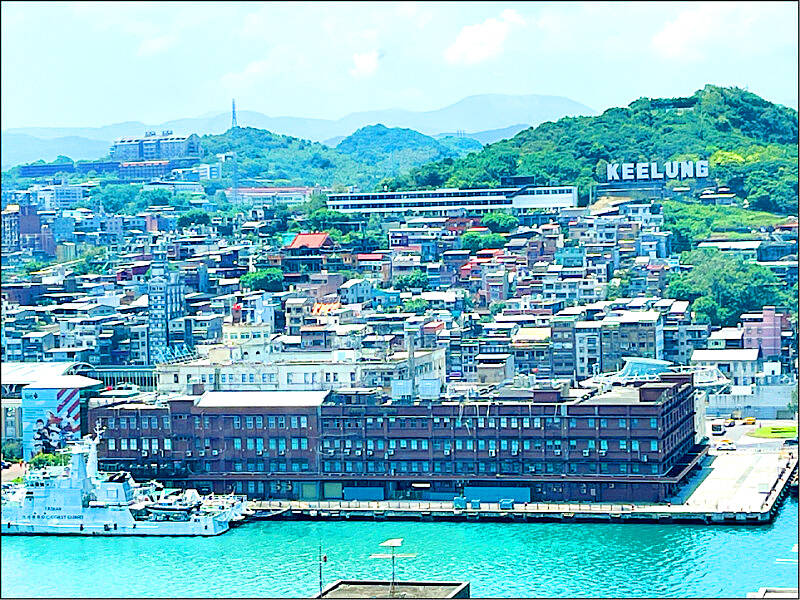Keelung last year became the nation’s “loneliest” city, with one-person households making up more than 41 percent of its households, the latest data from the Ministry of the Interior showed.
As of the end of last year, there were more than 3.57 million one-person households nationwide, accounting for 37.67 percent of the total households, the data showed.
The nation’s population spiked to a record 23.6 million in 2019 before consecutively declining year by year to 23.4 million last year.

Photo: Taipei Times
However, similar to Japan, the number of households climbed to about 9.49 million from about 8.83 million over the same period, despite the population shrinking, mainly because nuclear families were decreasing.
The number of one-person or two-people households has been rising over the past decade, meaning that households of people living alone or childless couples were increasing.
The number of one-person or two-people households increased to more than 5.59 million last year, or 59 percent of households, while households of four people or more declined over the same period, the data showed.
The number of households of five people or more — which were mostly three-generation families — dropped to about 985,000 last year, or 10.3 percent, dipping to fewer than 1 million for the first time.
Keelung was the “loneliest” among all administrative regions with its one-person households reaching 41.61 percent, while its households of six people or more accounted for 2.42 percent, the lowest in Taiwan.
It was followed by Taitung County and Taipei respectively, of which one-person households surpassed 40 percent each, the data showed.
The least lonely administrative region was Changhua County, of which one-person households made up 30.61 percent, while households of six people or more reached 9.66 percent, third behind Kinmen and Matsu (Lienchiang) counties.
As of June last year, the number of households of people aged 65 or older living alone was more than 1.03 million, up by about 300,000 people from 727,000 in August 2018.
Meanwhile, among the 19 administrative areas in Taiwan proper, only Taoyuan and Hsinchu County had positive natural population growth.
Yunlin County had the highest birthrate and death rate.
Of the six major cities, Taoyuan residents were the most willing to have children, while New Taipei City residents were the least willing.
The Taipei City Government was the most generous nationwide in terms of birth subsidies with NT$40,000 for the first child, NT$45,000 for the second and NT$50,000 for more.
Thanks to the boosted birth subsidies, the natural population decline in Taipei was 2,612 people last year, down from 4,330 people in 2023 and 6,255 people in 2022, the data showed.
The Yunlin County Government’s birth subsidy of NT$30,000 for each of the first three newborns remained unchanged, while the subsidy for the fourth newborn or more was raised to NT$100,000. The county had the highest birthrate last year.
New Taipei City, which had the lowest birthrate among the six major cities over the past few years, earlier this year increased its subsidies to NT$30,000 for the first newborn, NT$40,000 for the second and NT$50,000 for more.
Although Taipei provides the highest birth subsidies and has diminishing natural population decline, last year its social population decline gained speed, meaning that soaring house prices kept driving people away from the city.

CHAOS: Iranians took to the streets playing celebratory music after reports of Khamenei’s death on Saturday, while mourners also gathered in Tehran yesterday Iranian Supreme Leader Ayatollah Ali Khamenei was killed in a major attack on Iran launched by Israel and the US, throwing the future of the Islamic republic into doubt and raising the risk of regional instability. Iranian state television and the state-run IRNA news agency announced the 86-year-old’s death early yesterday. US President Donald Trump said it gave Iranians their “greatest chance” to “take back” their country. The announcements came after a joint US and Israeli aerial bombardment that targeted Iranian military and governmental sites. Trump said the “heavy and pinpoint bombing” would continue through the week or as long

TRUST: The KMT said it respected the US’ timing and considerations, and hoped it would continue to honor its commitments to helping Taiwan bolster its defenses and deterrence US President Donald Trump is delaying a multibillion-dollar arms sale to Taiwan to ensure his visit to Beijing is successful, a New York Times report said. The weapons sales package has stalled in the US Department of State, the report said, citing US officials it did not identify. The White House has told agencies not to push forward ahead of Trump’s meeting with Chinese President Xi Jinping (習近平), it said. The two last month held a phone call to discuss trade and geopolitical flashpoints ahead of the summit. Xi raised the Taiwan issue and urged the US to handle arms sales to

State-run CPC Corp, Taiwan (CPC, 台灣中油) yesterday said that it had confirmed on Saturday night with its liquefied natural gas (LNG) and crude oil suppliers that shipments are proceeding as scheduled and that domestic supplies remain unaffected. The CPC yesterday announced the gasoline and diesel prices will rise by NT$0.2 and NT$0.4 per liter, respectively, starting Monday, citing Middle East tensions and blizzards in the eastern United States. CPC also iterated it has been reducing the proportion of crude oil imports from the Middle East and diversifying its supply sources in the past few years in response to geopolitical risks, expanding

Pro-democracy media tycoon Jimmy Lai’s (黎智英) fraud conviction and prison sentence were yesterday overturned by a Hong Kong court, in a surprise legal decision that comes soon after Lai was jailed for 20 years on a separate national security charge. Judges Jeremy Poon (潘兆初), Anthea Pang (彭寶琴) and Derek Pang (彭偉昌) said in the judgement that they allowed the appeal from Lai, and another defendant in the case, to proceed, as a lower court judge had “erred.” “The Court of Appeal gave them leave to appeal against their conviction, allowed their appeals, quashed the convictions and set aside the sentences,” the judges